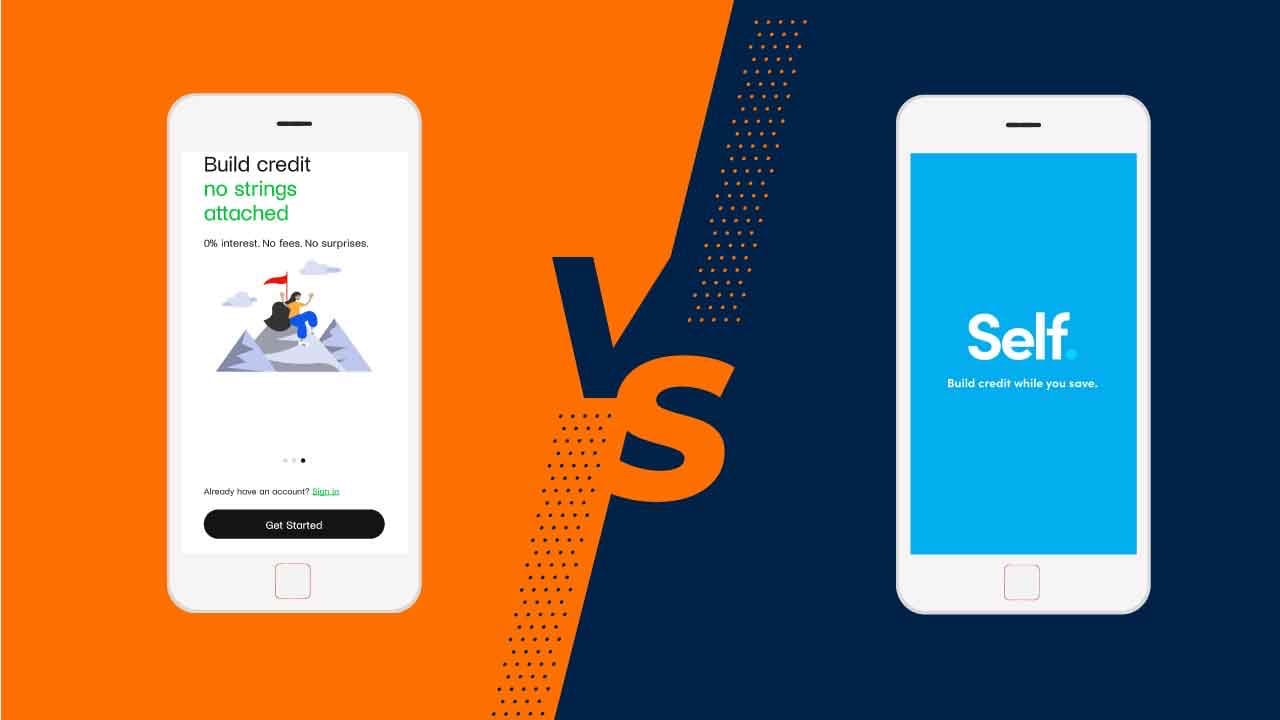Kikoff Vs Self (2025): Similarities, Differences



Are you looking for ways to improve your credit but don't quite know where to start? While there are many options available, one of the most talked about is deciding between Kikoff and Self. From understanding what each one provides, the differences in features and cost, to the pros and cons of both services – this blog post will dive deep into everything you need to know about choosing between Kikoff Vs Self. Read on to make an educated decision that's right for you!
Find below the key similarities and differences between the two credit building apps:
When it comes to building credit, two of the most popular credit building apps are Kikoff and Self. Both offer a range of services to help you build your credit, but they differ in some ways.
Indeed, they do not provide similar services, have very different origins, and their execution is clearly different.
Kikoff is a revolutionary line of credit with no interest,fees or credit check that allows users to build a credit account and get access to a revolving line of credits. With the Kikoff store, users can purchase items, with the convenience of being able to pay in installments over time.
Kikoff reports your on-time monthly payment to two major credit bureaus Experian and Equifax.
The app also includes helpful guidance and advice on budgeting, boosting financial wellbeing and understanding credit scores. Ultimately, Kikoff aims to empower users with greater financial control, accessibility and transparency.
Self Inc. is a financial technology company that offers credit-building loans to help consumers build their credit history and build savings. The company's unique product combines the concept of a traditional loan with the security of a Certificate of Deposit (CD) account, allowing customers to simultaneously build their credit and build savings for the future.
Self's innovative approach to credit-building loans is designed to provide individuals with an accessible and affordable way to build their credit. Unlike standard loans, which are paid back over time in fixed monthly payments, Self's credit-building loan requires borrowers to deposit to make installment payments towards the loan, in which the funds are held in a CD first before they can access the loan amount. This ensures that funds are safe and secure until they are completely repaid, allowing borrowers to stay on track financially while bettert their credit.
This is the first important difference between the two credit building apps: Kikoff is a line of credit that allows borrowers to draw on an available amount. Self, on the other hand, is a type of installment loan where borrowers are given a set loan amount at once and then repay it through fixed monthly payments over a predetermined time frame until the loan is paid off in full.
When comparing self vs Kikoff it is important to understand how these credit apps work.
A Kikoff credit account works by allowing you to make regular payments against the account balance, building positive payment history and reducing utilization which are both important factors in raising your credit score.
To use Kikoff, you first apply for an account with a few simple steps. Just provide basic information such as your name, address and email so that they can verify your identity. After that, you will be asked a few more questions about your financial situation in order to determine what kind of credit limit is best for you. Once approved, you will receive an account with its own unique number and instructions on how to make payments and manage the account online or through the Kikoff mobile app.
The most important feature of this type of lending product is that it offers a revolving line of credit which means that as long as you meet minimum monthly payments then the balance does not have to be paid off completely each month and can be carried forward from one month to the next. This allows for flexibility and also helps build up a positive payment history which is one of the key components in establishing good creditworthiness.
In addition, by making regular payments on the account balance it helps reduce overall utilization which is another key factor in determining someone's credit score. Utilization is calculated by taking into consideration the total amount owed across all accounts divided by total available credit limits; therefore, having low credit utilization ratio (which usually means keeping balances below 30% at any given time) shows lenders that one has access to funds but knows how to manage them responsibly.
Through Self’s Credit Builder Accounts, individuals are able to access a loan which is put in a secure, FDIC-insured Certificate of Deposit (CD) with no hard pull on their credit score. Each Credit Builder Account requires a set payment term and dollar amount, and these payments are reported to all three major credit bureaus Equifax Experian and Transunion in order to help bump the individual’s credit history.
Keep in mind that all payments are reported to the three credit bureaus, not just the ones that are on time.
When an individual signs up for a Self Credit Builder Account, the first step is choosing the terms of their account. The terms will include the amount of money being repaid each month, as well as the term length which is 24 months.
The company offers loan terms of 2 years, with flexible payment options 1 available for each term. The interest rates may vary depending on the selected option.
The second step is making monthly payments on time towards the account, which will be reported to all three major credit bureaus. The payments (including missed payments) will all be reported, whether they are on time or late. In other words, as long as the account is open, all payment activity, and the lack thereof, will be reported. Once the individual has paid off the Credit Builder Account in full, they can unlock their savings minus interest and fees.
The entire experience is tracked in real-time through Self’s mobile app where you can check your progress both in saving and building your credit history; you will also receive notifications when your payment reports have been updated. Moreover, if you need assistance at any point along your journey there is a dedicated customer service team available round-the-clock via email or phone call to provide guidance throughout every step of using Self’s Credit Builder Accounts.
Kikoff is a widely available credit boosting app that can be accessed across almost the entirety of the United States, with the exception of Delaware.
No matter where you live in the US, you can access Self through the website or our app. Unfortunately, it is not accessible outside of the US, including Canada, the UK, and other countries.
| Kikoff | Self | |
|---|---|---|
| Administrative Fees | $0 | $9 |
| Annual Fees | $0 | $0 |
| Late Payment Fees | $0 | 5% of the monthly payment amount if you do not pay within 15 days of the payment due date |
| Maximum APR | 0% | 15.97% |
| Length of time | No end time | Max. 24 months |
With Kikoff, borrowers can adjust their payment amounts depending on their current financial situation. Self loans, however, require borrowers to make consistent payments over an extended period of time regardless of their personal financial situation.
Unlike Self - which charges late fees if payments are not made on time - Kikoff’s late fees are waived if the customer contacts them before their due date. This makes it much easier for customers who may have difficulty making timely payments due to extenuating circumstances or unexpected expenses.
When deciding between Kikoff vs Self when building credit, both options offer advantages depending on what kind of user one might be looking for in terms of convenience and affordability.
Compared to Kikoff, one of the main advantages of using Self is that it reports payments to three major credit bureaus (Equifax, Experian & TransUnion). This is significant because it helps users establish their credit, which can be beneficial when applying for things such as mortgages or car loans.
However, the main advantage of using Kikoff over Self is its affordability; with a monthly membership fee starting at only $5, it’s an ideal option for those who want to build their credit without breaking the bank.
Another benefit is that it’s easy to use; its interface is simple yet effective. Finally, it provides excellent customer support should any issues arise while using the service.
In contrast, Self is an app designed specifically for people looking to build credit or build savings.
However, when selecting a payment option, Self customers need to consider how much they can afford as well as how quickly they want to pay off the loan balance. If you choose a shorter term than what was initially agreed upon at the start of your loan period, you can hurt your credit. Self encourages its customers to be mindful of these factors when deciding on which payment plan works best for them.
Ultimately though, it all depends on user preference; if someone needs quick results then Kikoff may be the right choice whereas those who want more comprehensive coverage may opt for Self instead. Indeed, Self is likely the better option if you live in one of the states not serviced by Kikoff or if you are willing to pay more to build your credit!
Disclosures
1 Sample products: A loan with a $25 month payment, 24 month term with a $9 admin fee at a 15.92% Annual Percentage Rate with a cost to build of $89; A loan with a $35 month payment, 24 month term with a $9 admin fee at a 15.97% Annual Percentage Rate with a cost to build of $125; A loan with a $48 month payment, 24 month term with a $9 admin fee at a 15.72% Annual Percentage Rate with a cost to build of $169; A loan with a $150 month payment, 24 month term with a $9 admin fee at a 15.88% Annual Percentage Rate with a cost to build of $533. Please refer to www.self.inc/pricing for the most recent pricing options. 5Average outcome for customers who opened a 12 month Credit Builder account in Q1 2021, who made on-time payments, based on Vantage Score 3.0. Other factors, including activity with your other creditors, may impact results. On-time payments does not mean full program completion and past performance based on this study does not guarantee future results. A credit score increase is not guaranteed.

We provide the best resources and information for the major ridesharing, bike sharing, kids sharing and delivery companies. Best Lyft driver Promo code and Postmates Referral code. Sign up at 100% working and they will give you the best sign up bonus at any given time.
A complete review of the Revolut app
Revolut
How to Lock an Electric Scooter and 5 Best Locks
E-Scooter Locks